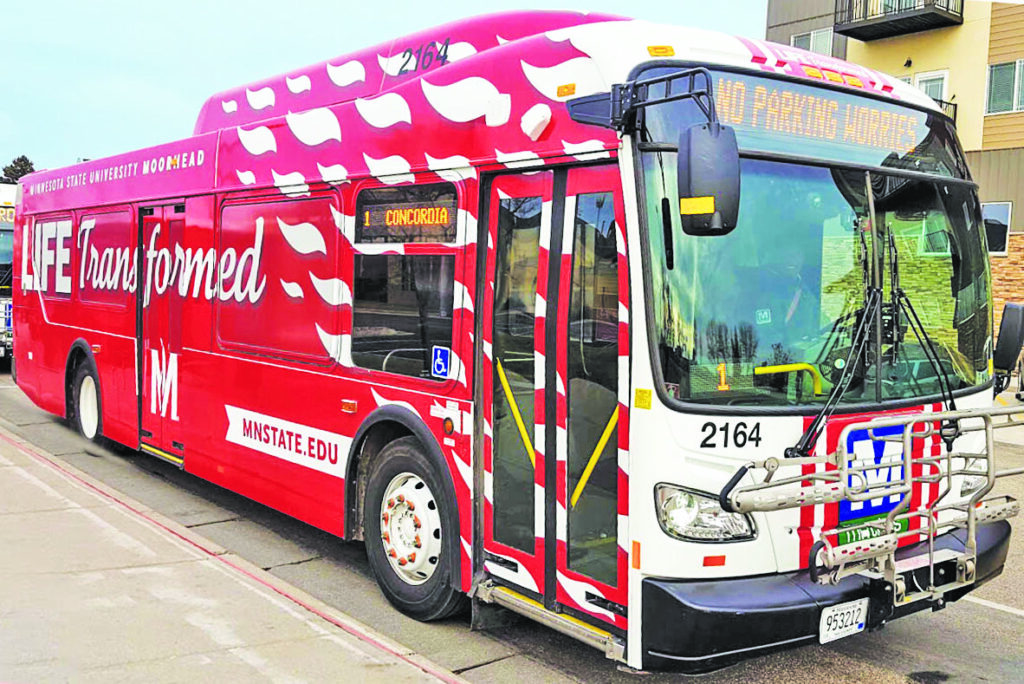
MATBUS riders will soon begin using new, improved smartphone apps to track buses’ progress, pay fares with their smartphones and — for paratransit passengers — arrange for rides. (Photo/MATBUS, Taaren Haak.)
Nancy Edmonds Hanson
The shortage of bus drivers continues to plague the Metro Area Transit bus system across Fargo-Moorhead, but the cities have found ways to adapt.
Riders have already adapted to one of the measures established to cope with the difficulty of recruiting staff: the now-permanent reduction of hours that was initiated in the wake of the COVID epidemic. The Moorhead City Council approved a resolution to make permanent the reduced hours – from 6:15 a.m. to 10:15 p.m. Weekdays, and 7:15 a.m. to 8:15 on Saturdays. In earlier days, the buses ran until 11:15 p.m. The Fargo City Commission also unanimously approved the MATBUS request to make the change permanent.
The change applies not only to the big buses that make their way through the city on a 30-minute cycle, but also to MATBUS Paratransit. That service provides scheduled rides for those who can’t travel on regular buses. They must be certified under the Americans with Disabilities Act.
“Our riders have already gotten used to the change,” Moorhead transportation manager Lori Van Beek pointed out. “We made the cutback as a temporary measure several years ago. This just makes it permanent.”
Few passengers were using the latest routes prior to the change – about 1%, she said. Only two objected at a public information session in early May, she added, both saying it would crimp their ability to attend evening events. “It was not necessarily that they could not go … more that they might want to,” she said with a smile.
Van Beek notes that the need for late-night transportation has changed since the pandemic. “Cashwise and Hornbacher’s now close at 10,” she points out. Stores that previously closed at 9 p.m., including West Acres, are locking the doors as early as 8 due to difficulty in staffing the longer hours: “West Acres is one of our hubs, so that makes a big difference.”
According to the manager, the shortage of drivers – a problem not only here, but across the nation – has forced the system to reduce the number of buses traveling certain highly used routes; now riders can catch them every 30 minutes instead of 15. Several routes were eliminated temporarily, including the one serving southeast Moorhead and Dilworth, but that has been restored.
The supply of drivers, who are hired and managed by the national corporation Transdev, has been trending up, she said. A big reason is that MATBUS negotiated successfully with Transdev to increase wages. Now drivers start at $23 per hour. Those who cover evenings and weekends, the most difficult to staff, also receive a $2 pay differential.
Ridership, Van Beek says, is rebounding from the dramatic dip caused by the pandemic. She cites numbers from 2018: 1.9 million across the entire system, with 521,000 in Moorhead alone. 2023 totals, in comparison, were 1.2 million citywide and 375,000 here. “The loss of college students to online classes was huge for us,” she reports. “Now, the shopping route to Walmart, Target and Cashwise have been coming back strongest,” she notes. “We’re up every year.” She expects another bump in the fall, when Route 2 including the MSUM campus will be restored.
While adjusting to today’s employment picture has presented managers with headaches, Van Beek says the system is about to debut new online computer software that will make riding easier and more convenient for their customers. “We’re finally able to replace the software that we’ve used since 2012.”
First to come is a new smartphone app for paratransit riders. The new software permits passengers to schedule their own pick-ups based on either the time they want to leave home or to arrive at their destination. The program will send reminders a day in advance, then notify the rider when their bus is 15 minutes away, and again when it arrives for them. Passengers will be notified when the installation is complete so they can download the new app online.
A new version of MATBUS Connect will be available for the rest of the system’s passengers in July. It will provide more reliable information on each bus’s whereabouts in real time. The Connect program, says Van Beek, will also work with the fare boxes the system purchased in 2019 but couldn’t install until 2022. “You’ll be able to download funds from your credit card onto the app, then just place it on the fare box to pay,” she explains. Among the new program’s benefits is the ability to receive free transfers for up to 90 minutes after first boarding, plus never being charged more than $3 per day, no matter how many trips are taken.
“There’s a $42 cap per 31 days, or $27 for the elderly and disabled,” she adds. After that, rides are free.
Passengers will still be welcome to pay cash as they board, she hastens to add: “But the system can’t keep track of what you’ve spent, so you don’t get the fare capping feature.” The Connect app and smart card are both free; fares are the same – $1.50 – for users of the app and those who pay cash.
The convenience should appeal to Moorhead riders, she predicts. In the past year, about 10% have been students, numbered among the 56% who are labeled “adults.” Eleven percent more are over the age of 60, and 26% are people with disabilities. School-age riders (K-12) make up 3% of the total, and preschool children account for 4% of rides.
Adult fares continue at $1.50, except for senior and disabled citizens, who pay half that amount. For more information on fares, routes and how to obtain the new smartphone apps, go to www.matbus.com.


